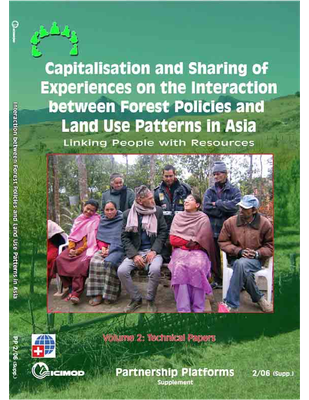Capitalisation and sharing of experiences on the interaction between forest policies and land use
More productive and sustainable use of sloping land and community-based natural resource management (CBNRM) are being recognised increasingly as major options in a range of natural resource sectors in Asia. CBNRM is also recognised as a useful mechanism in cross-cutting strategies; for example in poverty reduction initiatives, environmental management, and rural development. The workshop held in Godavari, near Kathmandu, Nepal, from 26-28 January 2005, brought together over 60 participants; they included policy-makers, project implementers, and representatives of local communities from Bhutan, China, India, Mongolia, Nepal, Pakistan, and Thailand; and representatives from two donor agencies – the Swiss Agency for Development Cooperation (SDC) and German Technical Cooperation (GTZ)—and three international organisations – the International Centre for Integrated Mountain Development (ICIMOD), the Regional Community Forestry Training Centre for Asia and the Pacific (RECOFTC), and the Centre for International Forestry Research (CIFOR) – to share the lessons learned from community forestry in Nepal and to explore opportunities for using them in other countries and for other natural resource types.
https://biodiversitylinks.org/projects/completed-projects/cbnrm/cbnrm-literature-review-sources/capitalisation-and-sharing-of-experiences-on-the-interaction-between-forest-policies-and-land-use-1/view
https://biodiversitylinks.org/projects/completed-projects/cbnrm/cbnrm-literature-review-sources/capitalisation-and-sharing-of-experiences-on-the-interaction-between-forest-policies-and-land-use-1/@@download/image/image.png
File
Capitalisation and sharing of experiences on the interaction between forest policies and land use
Author(s):
Pema Gyamtsho,
Bijay Kumar Singh,
Golam Rasul
Publication Date: 2006
Location: Hindu Kush-Himalayas
DOWNLOAD FILE
More productive and sustainable use of sloping land and community-based natural resource management (CBNRM) are being recognised increasingly as major options in a range of natural resource sectors in Asia. CBNRM is also recognised as a useful mechanism in cross-cutting strategies; for example in poverty reduction initiatives, environmental management, and rural development. The workshop held in Godavari, near Kathmandu, Nepal, from 26-28 January 2005, brought together over 60 participants; they included policy-makers, project implementers, and representatives of local communities from Bhutan, China, India, Mongolia, Nepal, Pakistan, and Thailand; and representatives from two donor agencies – the Swiss Agency for Development Cooperation (SDC) and German Technical Cooperation (GTZ)—and three international organisations – the International Centre for Integrated Mountain Development (ICIMOD), the Regional Community Forestry Training Centre for Asia and the Pacific (RECOFTC), and the Centre for International Forestry Research (CIFOR) – to share the lessons learned from community forestry in Nepal and to explore opportunities for using them in other countries and for other natural resource types.



